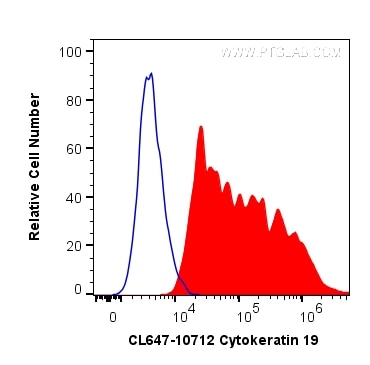Cytokeratin 19 Polyklonaler Antikörper
Cytokeratin 19 Polyklonal Antikörper für FC (Intra)
Wirt / Isotyp
Kaninchen / IgG
Getestete Reaktivität
human, Maus
Anwendung
FC (Intra)
Konjugation
CoraLite® Plus 647 Fluorescent Dye
Kat-Nr. : CL647-10712
Synonyme
Galerie der Validierungsdaten
Geprüfte Anwendungen
| Erfolgreiche Detektion in FC | HepG2-Zellen |
Empfohlene Verdünnung
| Anwendung | Verdünnung |
|---|---|
| Sample-dependent, check data in validation data gallery | |
Produktinformation
CL647-10712 bindet in FC (Intra) Cytokeratin 19 und zeigt Reaktivität mit human, Maus
| Getestete Reaktivität | human, Maus |
| Wirt / Isotyp | Kaninchen / IgG |
| Klonalität | Polyklonal |
| Typ | Antikörper |
| Immunogen | Cytokeratin 19 fusion protein Ag1085 |
| Vollständiger Name | keratin 19 |
| Berechnetes Molekulargewicht | 40 kDa |
| Beobachtetes Molekulargewicht | 44-50 kDa |
| GenBank-Zugangsnummer | BC007628 |
| Gene symbol | KRT19 |
| Gene ID (NCBI) | 3880 |
| Konjugation | CoraLite® Plus 647 Fluorescent Dye |
| Excitation/Emission maxima wavelengths | 654 nm / 674 nm |
| Form | Liquid |
| Reinigungsmethode | Antigen-Affinitätsreinigung |
| Lagerungspuffer | BS mit 50% Glyzerin, 0,05% Proclin300, 0,5% BSA, pH 7,3. |
| Lagerungsbedingungen | Bei -20°C lagern. Vor Licht schützen. Nach dem Versand ein Jahr stabil. Aliquotieren ist bei -20oC Lagerung nicht notwendig. 20ul Größen enthalten 0,1% BSA. |
Hintergrundinformationen
Keratins are a large family of proteins that form the intermediate filament cytoskeleton of epithelial cells. Keratin expression is highly regulated, tissue specific, and varies according to cell-state. Type I keratins consist of acidic, low molecular weight proteins with MW ranging from 40 kDa (KRT19) to 64 kDa (KRT9). Type 2 keratins consist of basic or neutral, high molecular weight proteins with MW from 52 kDa (KRT8) to 67 kDa (KRT18). Keratin 19 is a type I cytokeratin. It is a biochemical marker of skin stem cells in vivo and in vitro.
Protokolle
| Produktspezifische Protokolle | |
|---|---|
| FC protocol for CL Plus 647 Cytokeratin 19 antibody CL647-10712 | Protokoll herunterladen |
| Standard-Protokolle | |
|---|---|
| Klicken Sie hier, um unsere Standardprotokolle anzuzeigen |


